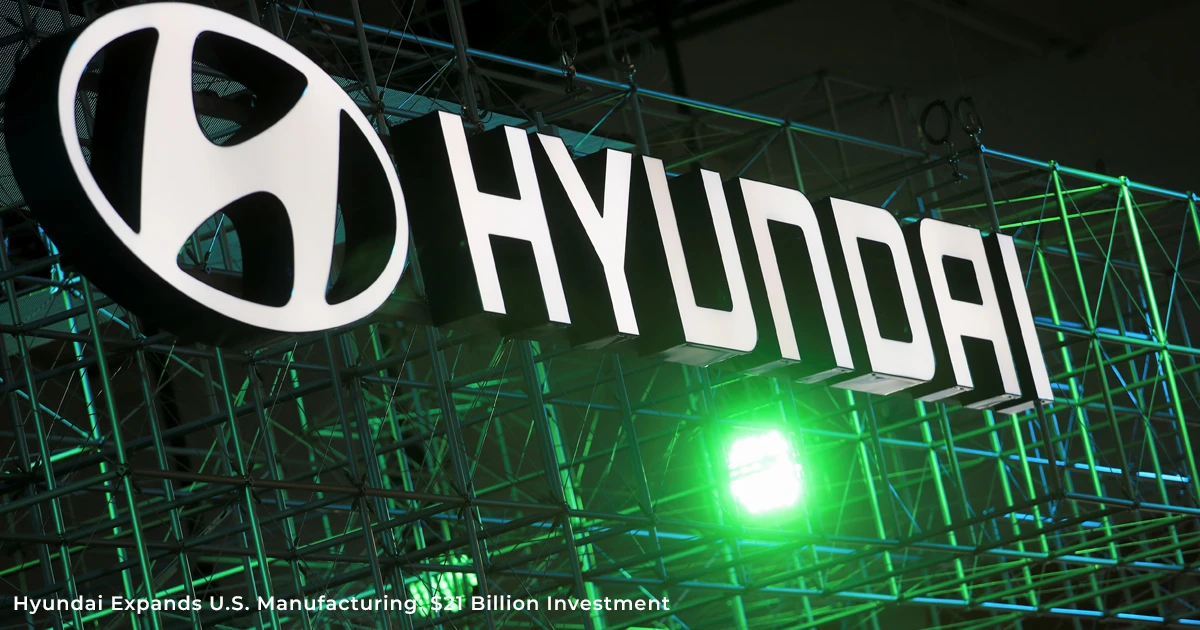

Hyundai’s $21 Billion Investment Expands U.S. Manufacturing
Hyundai Motor Group is investing $21 billion in the U.S. over the next four years to strengthen its market position. This move supports local production, helping the company compete in the evolving auto industry of the United States. Hyundai aims to reduce its reliance on imports and adapt to changing trade policies.
The blog covers Hyundai’s $21 Billion Investment in the U.S., its impact on local production, job creation, and strategic positioning amid evolving trade policies.
Table of contents
Hyundai’s Commitment: $21 Billion To U.S. Growth And Job Creation
Expansion Of U.S. Manufacturing And Job Creation
A large portion of Hyundai’s investment will be used to expand production within the U.S. Hyundai’s Metaplant in Georgia, which currently produces the Ioniq 5, will expand to accommodate additional models.
The company plans to increase vehicle output and enhance its manufacturing presence, benefiting American consumers. This move will create thousands of new jobs, solidify Hyundai’s presence in the U.S. auto industry, and support long-term economic growth.
Response To U.S. Trade Policies And Tariffs
The investment comes as the U.S. government enforces new tariffs on imported goods. Hyundai’s expansion aligns with these policies, allowing the company to avoid costly tariffs while maintaining a stable supply chain.
President Trump has promoted local manufacturing as a way to bypass these trade restrictions. Increased domestic production ensures Hyundai’s continued access to the U.S. market, securing its competitive position and reinforcing its commitment to building vehicles for American consumers (including those with the Hyundai Kona model).
Strengthening Hyundai’s Position In The U.S. Auto Market
Kia and Hyundai sold 1.7 million vehicles in the U.S. last year, making them the fourth-largest automotive group in the country. This expansion ensures increased vehicle availability and strengthens Hyundai’s presence in a highly competitive market.
With this new investment, Hyundai plans to manufacture over 1 million vehicles annually in the U.S.
Hyundai’s $21 Billion Investment: Expanding EV Lineup
Hyundai is focusing on increasing electric vehicle production as part of its investment plan. This move aligns with the rising demand for electric cars and positions Hyundai as a key player in the U.S. EV market.
The company plans to manufacture five new EV models and is also investing in hybrid models, ensuring a diverse lineup for consumers looking for fuel-efficient alternatives.
Hyundai Steel’s New Louisiana Facility
Hyundai’s investment includes a new $5.8 billion steel plant in Louisiana, designed to produce 2.7 million metric tons of steel annually.
This facility will create approximately 1,500 jobs, boosting local employment and economic development. The steel manufactured at this plant will be used in Hyundai and Kia vehicles (such as the 2025 Kia Telluride model) produced in the U.S., ensuring a more localized production process.
Collaboration With American Companies
Hyundai is exploring partnerships with American companies to enhance its product lineup. These partnerships could introduce new models built on American expertise while integrating Hyundai’s advancements in electric vehicle technology.
The automaker is in discussions with General Motors for potential collaborations, such as sharing vehicle platforms and engineering innovations.
Hyundai’s Long-Term Commitment To The US Market
Hyundai’s investment is not just a short-term reaction to trade policies—it reflects a long-term strategy for growth. The investment creates thousands of jobs, enhances manufacturing capabilities, and ensures Hyundai remains competitive.
Expanding domestic operations allows Hyundai to serve American consumers better (including those with the 2024 Hyundai Elantra model), solidifying its role as a major player in the country’s auto industry while preparing for future market changes.
Conclusion
Hyundai’s $21 billion investment in the United States underscores its commitment to expanding local production, strengthening its market position, and adapting to new trade policies. The company’s strategic focus on U.S. expansion reinforces its role as a key automotive leader. This move will boost job creation, increase vehicle availability, and secure Hyundai’s long-term success in the U.S.
Explore how Hyundai’s $21 Billion Investment is shaping the future of the U.S. auto industry and what it means for car buyers and manufacturers.
Add a comment Cancel reply
US Car Brands
- Acura (7)
- Aito (1)
- Alfa Romeo (6)
- Alpine (1)
- Aston Martin (2)
- Audi (28)
- Bentley (2)
- Best EVs (1)
- BMW (33)
- Buick (8)
- BYD (2)
- Cadillac (14)
- Car Accessories (1)
- Car News (76)
- Car Reviews (74)
- Chevrolet (21)
- Chrysler (3)
- Citroen (2)
- Classic Cars (2)
- Compare Car (2)
- Coupes (11)
- Crossovers (6)
- Dodge (3)
- EV/Electric Car News (104)
- Ferrari (7)
- Fiat (1)
- Ford (21)
- Genesis (13)
- GMC (6)
- Gordon Murray Automotive (1)
- Hatchbacks (7)
- Honda (19)
- Hybrid Car News (34)
- Hypercar (4)
- Hyundai (18)
- INFINITI (6)
- Jaguar (4)
- Jeep (8)
- KIA (17)
- Lamborghini (2)
- Lancia (1)
- Land Rover (5)
- Lexus (8)
- Lincoln (2)
- Lucid (1)
- Luxury Cars (2)
- Mahindra (1)
- Maserati (1)
- Mazda (8)
- McLaren (2)
- Mercedes (8)
- Mercedes-AMG (2)
- Mercedes-Benz (4)
- MG (2)
- Minivans and Vans (7)
- Mitsubishi Motors USA (3)
- Morgan Motor (1)
- New Launch (4)
- News (82)
- NIO (2)
- Nissan (18)
- Pickup Trucks (8)
- Polestar (3)
- Porsche (8)
- RAM (5)
- Range Rover (2)
- Renault (5)
- Rivian (7)
- Rolls-Royce (4)
- Scout Motors (1)
- Sedan News (49)
- Skoda (4)
- Slate (1)
- Sports Cars (32)
- Sports Sedan (4)
- Station Wagons (1)
- Stellantis (1)
- Subaru (11)
- Supercar (5)
- SUV News (187)
- TATA Motors (2)
- Tesla (19)
- Tips & Advice (2)
- Toyota (43)
- Truck News (24)
- Uncategorized (1)
- Upcoming Cars (126)
- Volkswagen (15)
- Volvo (8)
- Xiaomi Car (2)
- Zeekr (1)











